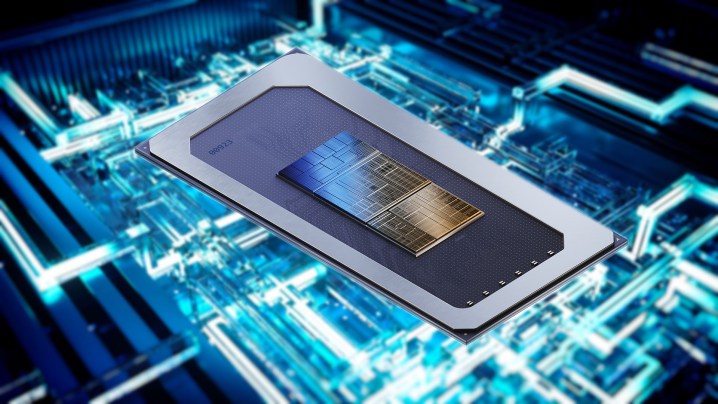Intel thinks your next CPU needs an AI processor — here’s why
Intel provided some details about how the dedicated AI processor in its upcoming Meteor Lake chips work, and how they'll be used in the future.


Intel thinks your next processor upgrade should include a dedicated AI processor and its upcoming Meteor Lake chips conveniently fill that gap. The company detailed how it suspects its Vision Processing Units (VPUs) will be leveraged at Computex 2023, and it’s including these processors stock on every Meteor Lake chip.
The VPU isn’t new. Intel introduced this dedicated AI processor with its 13th-gen Raptor Lake processors, but only on a select few models. The company says they’ll come on all Meteor Lake chips, which are slated to launch at the end of 2023.
Intel’s idea is simple: move AI processing that’s already happening on the CPU and GPU off to a dedicated processor. According to Intel, over 100 apps are already leveraging AI on the CPU or GPU, including the Adobe suite, Microsoft Teams, Avid Pro Tools, xSplit, Zoom, and Unreal Engine. The dedicated VPU is not only more power-efficient for these tasks to save battery life, but they also allow you to run much more complex AI models.
According to Intel, seemingly quaint effects like background replacement in Microsoft Teams and dynamic noise suppression have gotten exponentially for sophisticated over the last couple of years. Compared to 2021, Intel says background replacement is 10 times more complex, and dynamic noise suppression is 50 times more complex today.
With these effects, Intel says the VPU offers 10 times the AI computational power of running them on the CPU at only a fifth of the power. Although this efficiency is mostly focused on laptops, Intel made it a point to discuss power density with its VPU, with more efficient designs ultimately representing more peak performance. We could see more powerful dedicated AI processors if there are enough applications to leverage them.
Intel at CES 2023: Movidius VPU Makes Eye Contact in Video Calls | Talking Tech
Intel doesn’t want to offload all work to the VPU. The CPU and GPU still have their place. According to Intel, the GPU is still an ideal option for media creation tasks involving AI, while the CPU can handle simpler AI tasks that require very low latency.
In addition to providing more power to AI programs, Intel says the dedicated processor can improve overall performance. The company demonstrated this with Unreal Engine, where the VPU analyzed footage to create a mesh on a virtual avatar. This is normally handled by the GPU, so moving the task off to the VPU leaves the GPU open to handle other processing.
There could be some interesting use cases in the future. For instance, Nvidia’s Broadcast uses AI processors on RTX graphics cards for background blur, auto reframing, and eye contact features. You could move that work off to the VPU to free up the graphics cards for higher performance in games, especially if you’re using Broadcast is a streaming-style scenario.
Intel isn’t the only one focused on building AI into its processors. AMD Ryzen 7000 mobile processors also feature an AI processor, dubbed Ryzen AI. It should have similar applications as Intel’s VPU, though AMD hasn’t detailed its capabilities.
For now, these AI processors seem mostly focused on laptops. Rumors suggest Intel’s Meteor Lake may skip desktop entirely, while AMD hasn’t included its AI processor in Ryzen 7000 desktop processors. There may be a use for a dedicated AI processor on desktops in the future, but it seems Intel and AMD aren’t devoting too much attention there yet.
Editors' Recommendations
Intel 14th-gen Meteor Lake: news, rumors, release date speculation CES 2023: Intel’s new 13th-gen CPUs are faster, cheaper, and more efficient Intel Raptor Lake CPUs: Everything we know about the 13th-gen processors Why it’s hard recommending AMD Ryzen 7000 after Intel’s Raptor Lake launch Intel Raptor Lake sets a sizzling new record for clock speeds
Jacob Roach is a writer covering computing and gaming at Digital Trends. After realizing Crysis wouldn't run on a laptop, he…
3 reasons why I’m worried about Intel’s upcoming Meteor Lake chips
Intel recently unveiled its upcoming Meteor Lake CPU for desktops and laptops, and as a tech enthusiast, I'm really impressed. I'm also really, really worried.
Meteor Lake, or Intel 14th-gen, is still more than a year out, so it'd be silly of me to worry about performance. What I am worried about is how these chips are being developed and manufactured.
Meteor Lake uses too many different nodes and dies
How 14th-gen Meteor Lake plans to deliver on Intel’s road map
Intel peeled back the curtain on its 14th-gen Meteor Lake processors at Hot Chips 2022. Although we have to wait for 13th-gen Raptor Lake processors to make the rounds later this year first, Meteor Lake is shaping up to be an exciting generation that brings Intel's years-old plans full circle.
In mid-2021, Intel laid out a road map leading into 2025 that started with 12th-gen Alder Lake processors. Meteor Lake is the next significant step in that road map, as Intel moves down to its Intel 4 manufacturing process and begins to integrate multiple dies onto a single chip. Instead of Intel manufacturing everything, Meteor Lake will use dies from different vendors.
Full details of Intel Meteor Lake leak out: Here’s what to expect
Intel Meteor Lake is the upcoming 14th generation of Intel processors, rumored to release in the second half of 2023. Although there's still a long time to go before these CPUs hit the market, various leaks are helping us piece together a clear image of what Intel has in store.
According to the latest round of leaks, Intel Meteor Lake might introduce a host of changes and upgrades. This includes adding a new core type, bringing the current hybrid design up to three different cores.

 ValVades
ValVades 


































